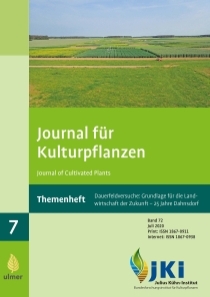2035 Arable Farming Strategy of the BMEL
DOI:
https://doi.org/10.5073/JfK.2020.07.03Keywords:
Arable Farming Strategy, Sustainable Agriculture, Soil, Crop Protection, Plant Breeding, Digitalisation, Biodiversity, Nutrition, Climate Change, Crop RotationAbstract
At the end of 2019, the Federal Ministry of Food and Agriculture (BMEL) presented a discussion paper on the Arable Farming Strategy. The Julius Kühn-Institut (JKI) was intensively involved in the preparatory work and supported the BMEL in developing the arable farming strategy. It describes six guidelines that define the framework for sustainable arable farming. In a total of 12 fields of action, challenges and conflicting objectives are named and corresponding objectives and measures are identified. Some of the contents of the arable farming strategy are presented below. It is also shown how departmental research – and the JKI in particular – is already actively supporting the implementation of the arable farming strategy today as well as in the future.
Downloads
Published
Issue
Section
License
The content of the journal is licensed under the Creative Commons Attribution 4.0 License. Any user is free to share and adapt (remix, transform, build upon) the content as long as the original publication is attributed (authors, title, year, journal, issue, pages).
The copyright of the published work remains with the authors. The authors grant the Journal of Cultivated Plants, the Julius Kühn-Institut and the OpenAgrar repository the non-exclusive right to distribute and exploit the work.







